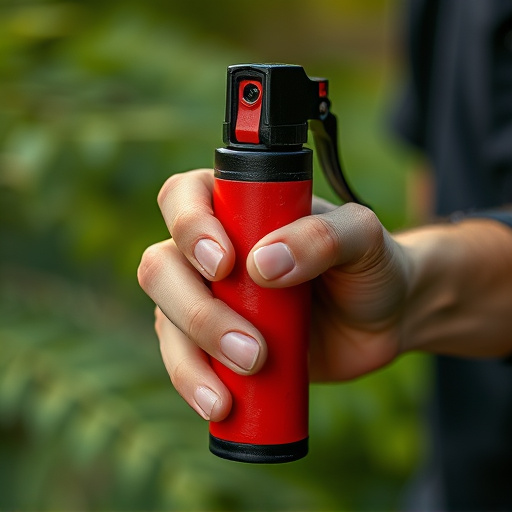Bear spray, a potent pepper spray solution, deters bear attacks by irritating the bear's eyes, nose, and respiratory system. After use, promptly decontaminate skin with 15 minutes of cool water rinsing, mild soap, and warm water to prevent further irritation or infections. When exploring outdoor areas with wildlife, combining bear spray with noise-making and awareness can prevent attacks. Proper decontamination of skin after using pepper spray is essential for minimizing adverse effects.
“Staying safe while enjoying outdoor adventures is paramount, especially with the increasing encounters near wild animals. This article equips you with essential knowledge on bear spray defense, a powerful tool in repelling animal attacks. We’ll explore the science behind bear spray and its effectiveness, offering practical tips for post-exposure decontamination of skin from pepper spray. Additionally, learn best practices to prevent attacks, ensuring your outdoor experiences remain memorable for all the right reasons.”
- Understanding Bear Spray and Its Mechanism of Action
- Steps to Decontaminate Skin After Exposure to Pepper Spray
- Best Practices for Preventing Animal Attacks While Outdoors
Understanding Bear Spray and Its Mechanism of Action
Bear spray, also known as pepper spray designed for wildlife encounters, is a powerful deterrent used to protect individuals from bear attacks. Unlike conventional pepper spray, bear spray is formulated with a higher concentration of capsaicin, the active ingredient responsible for its pungent and irritating effects. When sprayed, it creates a temporary but intense irritation in the eyes, nose, and respiratory system of the target animal, enabling the user to escape or de-escalate the situation.
The mechanism of action involves the spray’s ability to decontaminate the skin from pepper spray particles. Upon contact with the bear’s eyes, nose, and fur, the spray disrupts its sense organs and triggers a natural reaction to avoid the source of irritation. This temporary blindness and respiratory distress gives the user precious time to retreat or use other defensive measures. Effective bear spray training teaches users how to deploy it correctly, ensuring both safety and success in potentially life-threatening situations.
Steps to Decontaminate Skin After Exposure to Pepper Spray
After being exposed to bear spray, decontaminating your skin is a crucial step in ensuring you don’t experience further irritation or potential infections. Start by rinsing the affected area with plenty of clean, cool water for at least 15 minutes. This helps to dilute and wash away the pepper spray residue.
Once rinsed, gently dry the skin using a soft cloth or towel. Avoid scratching or rubbing the irritated area, as this can worsen the discomfort. If possible, use a mild soap and warm water to clean any remaining pepper spray particles. Rinse again thoroughly to remove all traces of soap. For sensitive areas like eyes, follow the same steps but be extra gentle. Applying a cold compress can also help soothe and reduce swelling in the immediate aftermath of exposure.
Best Practices for Preventing Animal Attacks While Outdoors
When venturing into outdoor spaces, especially in areas known for wildlife presence, preventing animal attacks is paramount. Beyond carrying bear spray as a defense mechanism, adhering to best practices can significantly reduce risk. Prioritize making noise while trekking through potential habitats to deter animals from surprise encounters. Stay aware of your surroundings, avoiding unpredictable movements that might trigger an attack. Keep food securely stored and avoid approaching wild animals, even seemingly docile ones.
Properly decontaminating skin after using bear spray is crucial. Thoroughly wash affected areas with soap and water immediately after exposure to minimize pepper spray irritation and potential secondary infections. Remember, prevention is key; understanding animal behavior, respecting their habitats, and remaining calm during encounters can go a long way in avoiding attacks.
Bear spray can be an effective defense against animal attacks, but proper usage and decontamination are crucial. After encountering bear spray, promptly follow steps to decontaminate skin from pepper spray, such as rinsing with water and neutralizing with a baking soda solution. Always adhere to best practices for preventing wildlife interactions, like making noise while hiking and storing food securely. By combining these measures, you can enhance your safety in outdoor environments where animal encounters are possible.
